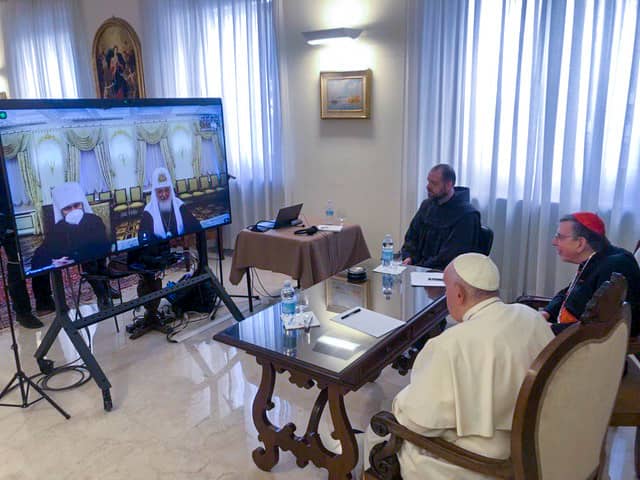ROME – In the German-speaking realm, two stories of Catholic interest unfolded over the weekend, and the juxtaposition between them would seem to have something to say about the ever-tenuous relationship between faith and secularism in the post-modern age.
In Garzweiler, Germany, a major coal mine located near Düsseldorf, police Sunday managed to clear roughly 1,000 protesters who had broken through barriers and occupied the site in an effort to shut it down. They had been buoyed by a major environmental rally that drew roughly 40,000 people from across Europe to the streets of Aachen Friday to demand immediate action to combat climate change.
Activists have also been emboldened by the recent success of Germany’s Green Party in May’s European elections, and the fact that the Greens are now roughly neck-and-neck with Chancellor Angela Merkel’s Christian Democratic Union in many polls. So powerful has the “Green Wave” become that Merkel recently endorsed the aim of making the entire country “climate neutral” by 2050, meaning that Germany would no longer be adding carbon dioxide to the atmosphere.
(That pledge comes despite the fact that European leaders over the weekend failed to agree on how to make the entire bloc carbon-neutral by 2050.)
By insisting on environmental action now, the German Greens (perhaps unknowingly) are carrying forward an important piece of Pope Francis’s social agenda, expressed in his 2015 eco-encyclical Laudato si’. No public figure in the early 21st century is more identified with the moral push for action against climate change than the pontiff.
Meanwhile, roughly 580 miles to the east along the A3 highway in Vienna, an exhibition women’s soccer match between a prominent Viennese club and the Vatican’s brand-new women’s team was abruptly cancelled when three members of the Viennese side bared their abdomens during the national anthems to display pro-choice slogans. (This was actually supposed to be the Vatican team’s first-ever game, celebrating the 20th anniversary of the FC Mariahilf Frauen und Mädchen franchise.)
Whatever one makes of the taste of the Viennese players in using an event that was supposed to be about friendship to grind political axes, or for that matter the judgment of the Vatican side in refusing to continue under the circumstances, the situation was a clear reminder of the gulf between mainstream secular European opinion on sexual ethics and the positions upheld by the Catholic Church.
In that sense, the soccer players were defying not only the Vatican but its current chief executive. Despite his vaunted progressive credentials in other areas, Francis is a dogged traditionalist on the matter of abortion. Among other things, he’s defined abortion as a “horrific crime” and a “very grave sin,” and, earlier this year, he compared the act of abortion to hiring a hitman.
What does the juxtaposition of the two developments have to say? Well, first and foremost, that in addition to the well-worn problem of “cafeteria Catholicism,” there’s an equally real phenomenon of “cafeteria secularism” when it comes to perspectives on the Catholic Church.
In effect, secularists such as the Viennese soccer players often tend to laud the pope or the Vatican when they happen to have a pre-existing reason for liking what they say, but at best ignore religious authority, and more often deride it, when they don’t want to hear the message.
Of course, successful political campaigns thrive on identifying clearly defined enemies, whether it was the Communists during the Cold War, Muslim extremists post-9/11, immigrants in several parts of the world today – or, for many a progressive-minded secularist, organized religion and the benighted view of the world it purportedly represents.
What these cafeteria secularists put at risk is is that for a surprising number of items on their to-do list – from serving the poor to defending the rights of indigenous and native peoples, from protecting the environment to opposing war and the arms trade – they’ve actually got no better friend on the global stage today than the Pope of Rome.
(I’m tempted to say that European secularists probably also ought to give Francis points for sharing at least some elements of their anti-American sentiment, but that’s probably a topic for another time.)
Granted, there are major differences on matters of sex, with abortion by far the most divisive, but that’s by no means the whole story. Moreover, while Francis may have added to the development of Catholic social teaching on some important points, he’s not speaking just for himself but rather giving voice to an entire tradition.
Imagine that those Vienna women’s soccer players had come out with a slightly different set of slogans on their bellies: Not just “Hands off our bodies,” but also “Thanks for Laudato si’” and “You’re the voice of the poor.”
Such a range would have had the virtue of intellectual honesty, and it also would have suggested the possibility of common ground even among people with quite different values. Instead, what we got was a one-sided display of hostility from presumably well-intentioned Viennese women, ironically acting in the name of tolerance.
Without a doubt, if the Church wants positive engagement with secularism, it’s got some work to do. Equally, however, secularists may need to abandon the cafeteria line and start looking at what’s actually on today’s Catholic menu.
Follow John Allen on Twitter: @JohnLAllenJr
Crux is dedicated to smart, wired and independent reporting on the Vatican and worldwide Catholic Church. That kind of reporting doesn’t come cheap, and we need your support. You can help Crux by giving a small amount monthly, or with a onetime gift. Please remember, Crux is a for-profit organization, so contributions are not tax-deductible.














